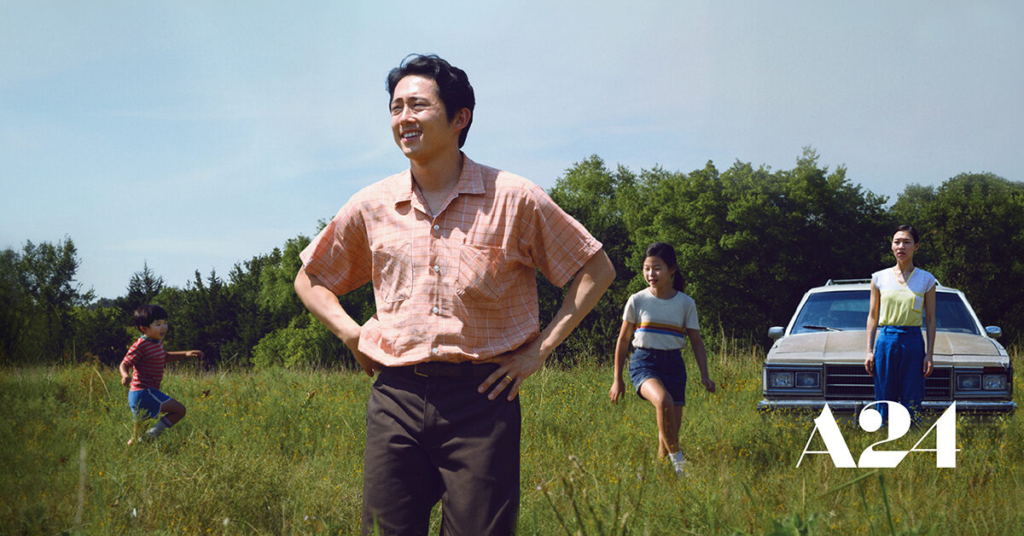A Slice of American Life and Family: Minari

Image courtesy of A24
By Noelia Veras
“The wind is blowing and the minari is blowing. They’re saying thank you very much.”
Minari is a subtle tale about the struggles and triumphs of a Korean-American family that moves to Arkansas to make a living through farming. Minari is a semi-autobiographical tale directed by Lee Isaac Chung, and it is nominated for six Academy Awards, including Best Picture and Best Director.
Steven Yeun plays Jacob Yi, the patriarch of the family, and Yeri Han plays the matriarch, Monica Yi. The Yi children, Anne and David, are played by Noel Kate Cho and Alan Kim, respectively.
According to the New York Times, Chung had given up on being an independent filmmaker in 2018, taking a position teaching screenwriting at the University of Utah’s South Korean campus. However, he still felt that he might have one last film to make, this film being what we now know as Minari.
“I tried to put everything I could into that script,” Chung said in reference to Minari.
The opening scene of the film shows the Yi family as they drive from California to Arkansas to move into their new home. The scene is gentle and contemplative, somewhat reminiscent of the opening scene of Studio Ghibli’s Spirited Away, where Chihiro anticipates and fears her new life in a new place glancing out the car window with mixed emotions. Like Spirited Away, the audience gets a glimpse of the car ride that rearranges the main character’s life and frames the premise of the narrative. The scene expertly closes up on the children’s faces, while interweaving shots of the rural landscape of Arkansas and the children’s parents driving and reading in the passenger seat.
The family moves into a mobile home in the middle of Arkansas. Monica is displeased by the entire circumstance, wishing they could move back to California. Jacob, however, is elated at the prospect of having so much land to be able to farm and have freedom.
After a storm frightens Monica, she decides to have her mother fly out from Korea to help raise the children and to bring her some sort of comfort. Monica’s mom Soonja reframes the narrative, changing the family dynamic. David doesn’t believe Soonja is a “real”grandma and says he doesn’t like her, adding more tension to the narrative.
Later in the film, it is Soonja’s idea to plant minari, with David by her side. Minari is a Korean plant used for cooking and also for healing and medicine.
The relationship between grandmother and grandson is at the center of the film and manages to encapsulate the American immigrant experience that complicates both family life and personal acceptance of one’s culture. In just this one relationship so much nuance is established and developed, creating an intimacy and honesty between the film and the viewer.
The film has been well received by audiences and critics alike. Many have especially connected with Kim both in and out of the movie. Kim is only 8 years old and this is his debut acting role. He has captured the hearts of viewers with his adorable personality.
After the critical acclaim of Minari, Chung has had a change in perspective regarding his future in filmmaking.
“I thought about quitting filmmaking because it was becoming so difficult for me,” Chung said according to Arkansas Times. “I didn’t know if this script would ever get made. I just thought, ‘Well, I’ll have this script and if my daughter can get to see it one day, that’d be great.’ So this is all quite a surprise.”
The Arkansas Times reported in the same article that when he was asked about his future in filmmaking and whether he felt stuck now, Chung laughed and said, “I’m stuck, in a way, but I’ve kind of reframed my thinking where I don’t feel like filmmaking is what defines me anymore. I kinda feel like I’m defined by my family and other things in life that are much deeper to me.”
Ultimately, Minari is about building a family and learning from the mistakes of the past. The film is equally about finding a home while being exiled from your native home. The growth of the minari by the end of the film ends up being the physical manifestation of the Yi family finding their place in Arkansas and growing their roots there. It’s the blending of the American soil and the Korean plant that adequately symbolizes the Yi family and their legacy in the United States.





